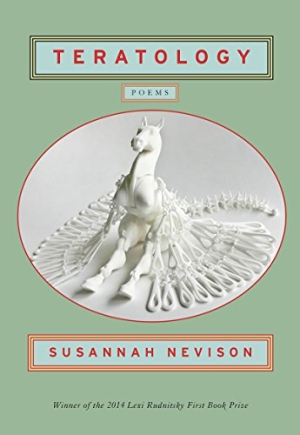Teratology
This collection is striking in the way each individual piece feels essential to the whole, allowing for discovery, rediscovery, and the crafting of a new home for the soul.
Teratology is a dynamic and beautifully hewn collection of poems by Susannah Nevison. Redolent images create a past and a present that must cope with an underlying uncertainty about what experiences of and within the body make one less than human, make one superhuman. This continual sense of discovery and rediscovery—along with birds, along with rivers—inhabits stunning poems that daringly enter the most tender of places.
Bodies are broken and mended within Nevison’s poems. Hospital scenes unfold alongside rivers; horses and hounds and birds visit in the presence of painkillers. In “Morphine, The Recurring Dream of Birds,” the poet writes, “that your bones ring hollow / as beaks—that birds carry / you home in pieces—.” Later, in another poem of the same name, hands are mistaken for “birds / threading nests with hair or swab or gauze.” Again and again, the natural world is surgeon and salve; it is what cuts and cleaves, what haunts and what heals. Like the birds, the river is what one must be rescued from, and what one longs for.
All poems fit together without contrivance; they simply must all be there as they are, and the result is a book that gains momentum while also shaping itself gorgeously. “Lineage,” “Experimentum Suitatis,” and “In the Long Grass Kneeling” can be read and reread—just as the collection itself can be.
The story the poet tells here is one that jolts, one that captivates because of its affecting images of injury to skin, to limb, to the symmetry that is supposed to hold beauty. But in the attention to specifics of the body is creation—is something else and something new and something beautiful, entirely. Nevison writes in “Another Kind of Clay,” “We can spend our whole lives / trying to inhabit our lives.” One cannot help but feel that with Teratology, Nevison has crafted a new home of sorts, and has left the door open.
Reviewed by
Margaret Fedder
Disclosure: This article is not an endorsement, but a review. The publisher of this book provided free copies of the book to have their book reviewed by a professional reviewer. No fee was paid by the publisher for this review. Foreword Reviews only recommends books that we love. Foreword Magazine, Inc. is disclosing this in accordance with the Federal Trade Commission’s 16 CFR, Part 255.

